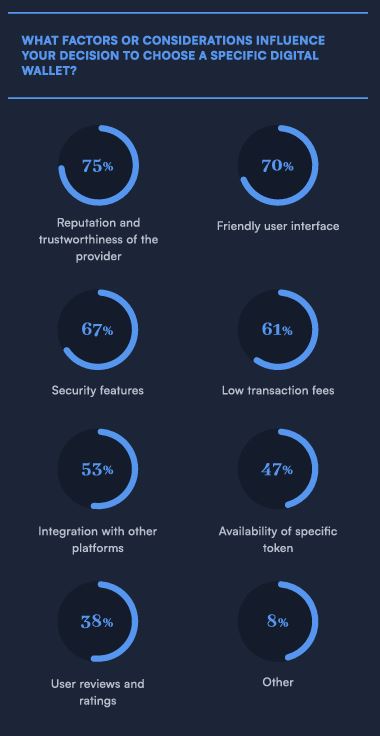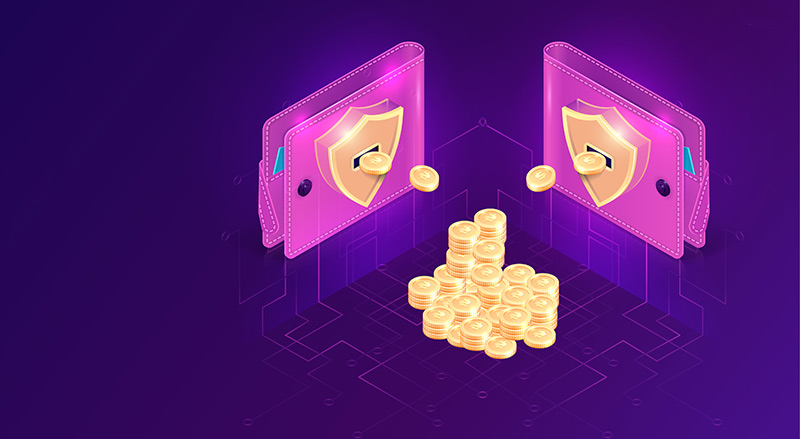The BSV Association recently conducted a survey of members in its ecosystems to look at the different ways it can improve the digital wallet experience. The survey, which was conducted in July 2023, focused specifically on how the user experience around digital wallets can be improved.
Participants were also asked about their personal preferences around choosing a wallet, how they access and use their wallets and the importance of privacy and customer support. This information is invaluable and the BSV Association and its partners at TAAL would like to extend their heartfelt thanks to all those who participated and offered their feedback.
Choosing and using a digital wallet
The survey results show that wallet users have clear preferences when it comes to choosing a wallet. The majority (75%) said that they consider a wallet and provider’s reputation, while 70% said that a good user interface is also vital.
Also important are security features (67%), low transaction fees, and integration with other platforms (53%) are all also important factors when choosing a wallet. Notably, the data shows that users are relatively platform agnostic when choosing how they access their wallets, with most users indicating that they are happy to use a mobile app, desktop app or browser extension, depending on the situation.
Users typically topped up their wallets by purchasing Bitcoin from exchanges (41%) and receiving funds from others (40%). However, the survey shows that users are far more split on their preferences when it comes to sending money with 37% opting to copy an address, 31% indicating that they would scan a QR code, and 21% using a contact list.
The data shows that just under 50% of users use their digital wallets to send and receive funds daily, while just under a third (30%) use their wallets weekly.

Privacy and security of digital wallets
The survey results are clear that security is one of the biggest factors when choosing a wallet, with 60% of respondents describing privacy as “extremely important” when selecting which digital wallet to use. This means it is essential to opt for a well-established and reputable provider with a proven track record in the industry to avoid falling victim to scams or unreliable services.
It is therefore somewhat concerning that 42% of respondents said they were only “somewhat confident” in their current wallet’s privacy and security features, while 31% said they were undecided.
The respondents were also very clear in outlining the additional privacy features or improvements that digital wallets could introduce. These suggestions included:
- The introduction of two-factor authentication and biometric scanners.
- Removing third-party certifications.
- Iris integration and the ability to encode data on-chain.
- The ability to see exactly what personal data is being stored.
- Safeguards if an address or other information has been incorrectly copied.
- Frustration with “authentication” apps and an overreliance on “hackable” security features such as PIN codes.
Customer service
The survey results also show that good customer service is still vital in attracting new users and retaining them. A reputable wallet provider offers efficient and responsive customer service to address any concerns or issues that users may encounter during their transaction journey.
Just 45% of respondents felt that they were adequately informed about transaction fees, while 68% said that they require at least occasional support when using a digital wallet.
Notably, 50% of respondents felt that it was very important to have some sort of unified integration between their digital wallets and their financial institutions.
New features
As part of the survey, respondents were also asked to expand on some of the new features or improvements which could be made to make digital wallets more user-friendly and efficient. Some of the proposals include:
- A smart contract trusts if a wallet owner dies.
- Value-Added Tax (VAT) functionality.
- A specific Web3 browser which allows you to carry over usernames and passwords between websites.
- “Background wallets” which allow users to create wallets and only assume control when holdings become important to them.
- Better segregation of different types of NFTs.
- A “locking mechanism” and the option to set up different savings pools which cannot be accessed before a certain date.
- Better wallet integration with traditional banks.
The BSV Association would again like to extend its heartfelt thanks to all those who participated in the survey and provided feedback. The Association is committed to improving the user experience around digital wallets and within the wider ecosystem – watch this space!
You can find the full survey results here.
